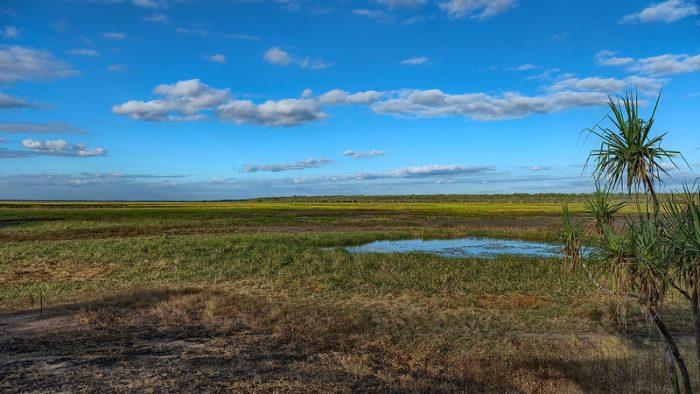
It’s hard to argue against the importance of a modern coastal city in Australia’s Top End to geopolitics, the economy and the nation’s security. Darwin’s long history as a military post attests to that.
Populations thrive when people live in viable ambient environments, have access to prosperous local economies and can participate in community life. In recent years, Darwin’s economy has struggled in key areas. The challenges faced by the Northern Territory government are significant and fiscal belt-tightening is embodied in its budget recovery plan.
A variety of economic opportunities should be encouraged. These range from investment in commercialisation of natural resources to the development of critical water infrastructure and capitalising on Darwin’s proximity to Southeast Asia.
Darwin enjoyed an energy boom in the early 2000s as ConocoPhillips built the city’s first LNG processing plant. This continued when Inpex announced its $37 billion LNG plant and pipeline to address Japanese demand. But economic activity flattened with the plant’s completion in 2018.
Last year the NT gas taskforce was established to support and expand Darwin’s role as an LNG export hub, to grow the gas supply and service industry. Sources of support for significant infrastructure investment, such as the Northern Australia Infrastructure Facility, exist to provide loans to infrastructure projects across the nation’s north. These links should be encouraged.
With Darwin’s annual wet season, it seems counterintuitive that the city needs a more resilient and better-managed water supply. But the need for better water management has long been recognised and is reflected in Darwin’s water strategy and climate change plan, and the territory government’s 10-year infrastructure plan.
Darwin’s water situation was also listed in the 2016 Australian infrastructure plan as a medium-term issue of importance, with a timeframe of five to 10 years. Ahead of it are two other important items: enhancing essential services in remote communities and upgrading the Tanami Road from Alice Springs to Halls Creek in Western Australia. These items, too, may be some time in coming. They exist on paper as ‘initiatives’—potential infrastructure solutions for which a business case has not yet been completed—and not as projects underway.
While potable water is essential for normal life, the need to diversify Darwin’s water supply seems to be drastically under-recognised at the federal level. Anecdotal evidence suggests also that the owners of larger properties near the capital are having to drill bores to ever-increasing depths to access water.
Given the great emphasis on water issues in territory planning documents and the difficulties with accessing bore water, it seems incongruous that a critical service such as potable water is so underrated as a priority in national infrastructure planning. This is an issue where the territory and federal governments should engage in detailed negotiations.
The third growth opportunity is in the digital economy. While this area is being examined by the NT government in its infrastructure plans, there are opportunities for more innovative thinking that makes the most of Darwin’s proximity to Southeast Asia.
The NT could promote the development of a subsea internet link between Darwin and Singapore via East Timor, which is less than 700 kilometres away. This would add resilience to Australia’s global connectivity and support other investments in the digital economy for Darwin.
The logic for this, from a national resilience perspective, is that there are currently only two landfalls for subsea internet cables in Australia: Perth and Sydney. Historically, 95–99% of the country’s internet needs have been serviced by a limited number of undersea cables coming into these locations. While there’s more than one cable in Sydney and Perth, having connections at more than two locations makes sense not just in terms of redundancy.
The Singapore-to-Perth subsea connection (approximately 4,600 kilometres in length) has been increasingly unreliable in recent years. When the link failed, internet traffic was routinely diverted through the eastern seaboard, resulting in slower transmission speeds. A new cable from Singapore to Perth was brought into service late last year.
A connection (with a landing station) to the new 9,600-kilometre Japan–Guam–Australia cable is being built in Maroochydore on Queensland’s Sunshine Coast. This link to Asia is expected to be operational in mid-2020 and it’s estimated that the project will add up to $900 million to the state economy and boost local employment.
A subsea internet link to Southeast Asia seems especially worthy of deeper investigation given current plans for extensive internet commerce and connectivity across the region as outlined in ASEAN’s master plan.
A related area of possible development for Darwin, given the size of its harbour, is to host submarine cable maintenance services for the region. The South East Asia and Indian Ocean Cable Maintenance Agreement (SEAIOCMA) is a cooperative entity managed by 46 submarine cable owners to repair and sustain these cables.
As its name suggests, SEAIOCMA spans much of the Indian Ocean and all of Southeast Asia. It also covers large parts of East Asia and Australia. A dedicated repair ship is based at Subic Bay in the Philippines, and support services in Batangas provide repair, reinstatement and preventive maintenance of cable systems. The current cable maintenance agreement expires on 31 December 2022 and a more central maintenance node in Darwin could be an attractive option.
Defence and security will always make Darwin a priority from a national perspective but, as our northernmost capital city, different ideas to make the city more economically resilient need to be supported. Darwin will always have a ‘spirit of place’ as long as people want to live there.
It’s already a ‘smart’ place, but it needs encouragement and access to investment funds to be an ‘innovative’ place.
The time to act is now.